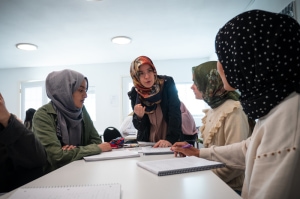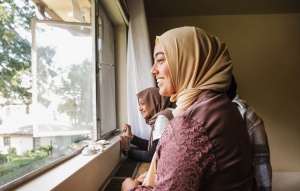The Zaytuna Garden: Cultivating Virtue
“We’re on the same latitude as Madina al-Zahra in Al-Andalus,” says Imam Dawood Yasin, Director of Student Life and Zaytuna’s Center for Ethical Living and Learning. He’s referring to Zaytuna’s campus, which shares a latitude with the former Muslim metropolis commissioned in the 10th century under the caliphate of Abd al-Rahman III, the first Ummayad Caliph of Cordoba.
“This is more than just a happy coincidence”, notes Yasin. “When two places on the globe share a latitude, they also closely mimic each other’s climates. That means that whatever vegetation was likely to thrive in the old Muslim city will likely do so on this new Muslim campus.”
Zaytuna’s permaculture garden is still relatively new. Its orchard has 30 fruit-bearing trees, among them the plums and passion fruit are farthest along. The fences that surround the raised beds and protect them from deer that live in the nearby woods went up this year. In about a year, after much tinkering with what seems to grow best and what most agrees with the tastes of Zaytuna’s students, the garden and those who care for it seem to have found a rhythm.
“The sole intention of creating the permaculture garden was to produce tayyib [spiritually pure] food for the students,” explains Imam Dawood. While parts of Zaytuna’s campus serve as a place of meditative calm for the students, the permaculture garden is intended to nourish the body. Student volunteers learn to become acquainted with the garden by preparing the raised beds and supporting the compost system that takes food waste and carefully returns it to the soil.
In an age of affluence and convenience, the concept of holistic learning and living may seem antiquated, but did we lose something greater in our material pursuits? The garden and its harvest may be the perfect answer to that question by reminding us of our primordial needs. Imam Dawood believes so, and he’s already witnessed how working in the garden expands a student’s sense of his or her own capabilities. For him, these observations are in line with a statement from Raghib al-Isfahani in his book The Path to the Noble Qualities of the Sacred Law.
“Man has three specific functions. The first is to cultivate and prosper in the earth… The second is to worship God… The third is […] the imitation of God in accordance with man’s ability to rule by applying the noble qualities of the Law, which are wisdom, justice, forbearance, beneficence and graciousness.” This reflection is the operating principle of the Zaytuna garden.



